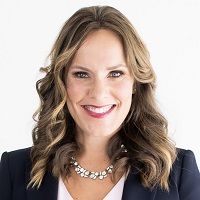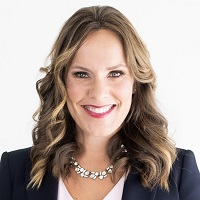Financial Planning: Sisters Should Be Doin' It for Themselves
More and more women are ringin' on their own financial bells (with apologies to Aretha Franklin and Eurythmics) — but that demands a robust financial plan.


Profit and prosper with the best of Kiplinger's advice on investing, taxes, retirement, personal finance and much more. Delivered daily. Enter your email in the box and click Sign Me Up.
You are now subscribed
Your newsletter sign-up was successful
Want to add more newsletters?

Delivered daily
Kiplinger Today
Profit and prosper with the best of Kiplinger's advice on investing, taxes, retirement, personal finance and much more delivered daily. Smart money moves start here.

Sent five days a week
Kiplinger A Step Ahead
Get practical help to make better financial decisions in your everyday life, from spending to savings on top deals.

Delivered daily
Kiplinger Closing Bell
Get today's biggest financial and investing headlines delivered to your inbox every day the U.S. stock market is open.

Sent twice a week
Kiplinger Adviser Intel
Financial pros across the country share best practices and fresh tactics to preserve and grow your wealth.

Delivered weekly
Kiplinger Tax Tips
Trim your federal and state tax bills with practical tax-planning and tax-cutting strategies.

Sent twice a week
Kiplinger Retirement Tips
Your twice-a-week guide to planning and enjoying a financially secure and richly rewarding retirement

Sent bimonthly.
Kiplinger Adviser Angle
Insights for advisers, wealth managers and other financial professionals.

Sent twice a week
Kiplinger Investing Weekly
Your twice-a-week roundup of promising stocks, funds, companies and industries you should consider, ones you should avoid, and why.

Sent weekly for six weeks
Kiplinger Invest for Retirement
Your step-by-step six-part series on how to invest for retirement, from devising a successful strategy to exactly which investments to choose.
Women will likely be the primary holders of wealth in the U.S. by 2030. An often overlooked aspect of the much-discussed transfer of wealth from Baby Boomers to Millennials is how this generational handoff can increase women’s financial influence.
Over the past five years, there has been a 30% increase in married women who make financial decisions, according to a study from McKinsey, and today they control around one-third of the financial assets of U.S. households. This trend is expected to continue: By 2030, women will likely manage over $30 trillion in assets. Now is the time for women to take control of their financial life, invest in financial education, and practice intentional and holistic financial planning.
While managing finances can feel like just another thing on a to-do list, doing so confidently can allow for aspirations to become reality. Using money to help achieve a life goal or vision is what matters.
From just $107.88 $24.99 for Kiplinger Personal Finance
Become a smarter, better informed investor. Subscribe from just $107.88 $24.99, plus get up to 4 Special Issues

Sign up for Kiplinger’s Free Newsletters
Profit and prosper with the best of expert advice on investing, taxes, retirement, personal finance and more - straight to your e-mail.
Profit and prosper with the best of expert advice - straight to your e-mail.
Women in particular face layered challenges in managing their finances while striving to achieve their life goals — for themselves and for their families. How money is managed can have a major impact on the ability to achieve goals.
Layered financial challenges
In my 15-year career working with clients in the wealth management industry, I have developed close relationships with many women who face various pressures on their time and finances.
First, women typically live longer than men. We need to ensure we and our families are set for today but also plan for our own longevity. In the U.S., women's life expectancy is about five years longer than men's.
Secondly, it’s critical to be prepared for “suddenly single” life events. Expect the best, prepare for the worst. No one plans on their spouse leaving or passing away unexpectedly, but it’s important to be prepared financially.
Preparing for the unexpected can help provide financial stability and confidence. Before you're able to unleash your full potential, you must first take care of the necessities.
Some of these priorities include:
- Taking care of the family and everyday expenses
- Saving for children’s education
- Saving for retirement
- Managing a career
- Supporting aging parents
- Having a sufficient nest egg should you find yourself suddenly single
In addition to necessities, everyone has different non-negotiables they value. Some common goals to save for include:
- Nice dinners or shows
- Weekend getaways
- Vacations
- New experiences
- A second home
- Helping your kids be debt-free
- Helping your kids with a down payment for a car or their first home
As a working mother myself with six young children, I understand all that goes into managing these priorities and goals from a firsthand perspective and the impact that can have on one’s mental and financial wellbeing. Fortunately, there are effective strategies to help you manage finances and achieve the life you envision.
Strategies for managing finances
Whether it’s about career advancement, providing for a family or pursuing a personal passion, it’s important to ensure that your money is working to shape a vision. Taking the financial reins requires asking how that money will be spent, and understanding that money is a tool to support a desired lifestyle. View managing money as an opportunity to design a dream life, not as a burden.
Before deciding how to manage your money, it’s important to decide what you want out of life. How will that money be spent — to travel or buy a second home? For a car payment or fine art? It’s also critical to consider how a spouse or partner will factor into the shared objectives for this money.
Once your financial situation is determined, divide the budget into two buckets: one for necessities, and the other as a “vision bucket” that will be used to help achieve this life vision.
Educate yourself on building wealth
Not only is it necessary to understand how to manage current money, it is also important to know how to build wealth for a prosperous future. Some important strategies to help build wealth include paying yourself first, investing for retirement, identifying optimal insurance plans, planning for the tax implications of your investments, and making sure your estate is in order.
First, develop a financial plan that designates where to save and invest. Build a savings account that includes an emergency fund and anything that should be liquid in the next five years. In addition to building up savings and investments, it’s crucial to protect yourself and your loved ones against unplanned events with the right insurance plans. Furthermore, estate planning is important to ensure that hard-earned wealth benefits the people and causes you want to support.
Once those essentials are taken care of, you can begin delegating the remaining funds to the vision bucket.
All expressions of opinion reflect the judgment of the author as of the date of recording and are subject to change. Some of the content provided comes from third parties that are not affiliated with Mercer Advisors. The information is believed to be accurate but is not guaranteed or warranted by Mercer Advisors.
This information is provided for informational purposes only and is not intended as and may not be relied on in any manner as legal, tax or investment advice, a recommendation, or as an offer to sell, a solicitation of an offer to purchase or a recommendation of any interest in any fund or security Any such offer can be made only via the relevant access fund's formal offering documents. This information is not intended to address the financial objectives, situation or specific needs of any individual investor. All investing involves risk including the possible loss of principal. Diversification does not ensure a profit or guarantee against loss. Investing in private funds is speculative and will entail substantial risks. Mercer Global Advisors Inc. is registered with the Securities and Exchange Commission and delivers all investment-related services. Mercer Advisors Inc. is a parent company of Mercer Global Advisors Inc. and is not involved with investment services.
Related Content
- Half of All Households Have a Female CFO. Does Yours?
- Women's Wealth Growing: How to Handle It Like a Pro
- Three Steps for Women to Take Control of Their Finances
- What Every Woman Needs to Know Before Retiring
- How Women Can Prepare to Take on Financial Challenges
Profit and prosper with the best of Kiplinger's advice on investing, taxes, retirement, personal finance and much more. Delivered daily. Enter your email in the box and click Sign Me Up.

Laura began her career in the investment management industry in 2008. As a Managing Director, member of both the Investment Committee and Senior Leadership Team, Laura has distinguished herself as an advisor and experienced leader with a passion for helping clients find their path to Economic Freedom™. She’s been recognized by the Thrive Awards, named a Top Woman Advisor by Forbes and a top 40 Under 40 Advisor by InvestmentNews.
-
 Nasdaq Leads a Rocky Risk-On Rally: Stock Market Today
Nasdaq Leads a Rocky Risk-On Rally: Stock Market TodayAnother worrying bout of late-session weakness couldn't take down the main equity indexes on Wednesday.
-
 Quiz: Do You Know How to Avoid the "Medigap Trap?"
Quiz: Do You Know How to Avoid the "Medigap Trap?"Quiz Test your basic knowledge of the "Medigap Trap" in our quick quiz.
-
 5 Top Tax-Efficient Mutual Funds for Smarter Investing
5 Top Tax-Efficient Mutual Funds for Smarter InvestingMutual funds are many things, but "tax-friendly" usually isn't one of them. These are the exceptions.
-
 Quiz: Do You Know How to Avoid the 'Medigap Trap?'
Quiz: Do You Know How to Avoid the 'Medigap Trap?'Quiz Test your basic knowledge of the "Medigap Trap" in our quick quiz.
-
 We Retired at 62 With $6.1 Million. My Wife Wants to Make Large Donations, but I Want to Travel and Buy a Lake House.
We Retired at 62 With $6.1 Million. My Wife Wants to Make Large Donations, but I Want to Travel and Buy a Lake House.We are 62 and finally retired after decades of hard work. I see the lakehouse as an investment in our happiness.
-
 Social Security Break-Even Math Is Helpful, But Don't Let It Dictate When You'll File
Social Security Break-Even Math Is Helpful, But Don't Let It Dictate When You'll FileYour Social Security break-even age tells you how long you'd need to live for delaying to pay off, but shouldn't be the sole basis for deciding when to claim.
-
 One of the Most Powerful Wealth-Building Moves a Woman Can Make: A Midcareer Pivot
One of the Most Powerful Wealth-Building Moves a Woman Can Make: A Midcareer PivotIf it feels like you can't sustain what you're doing for the next 20 years, it's time for an honest look at what's draining you and what energizes you.
-
 I'm a Wealth Adviser Obsessed With Mahjong: Here Are 8 Ways It Can Teach Us How to Manage Our Money
I'm a Wealth Adviser Obsessed With Mahjong: Here Are 8 Ways It Can Teach Us How to Manage Our MoneyThis increasingly popular Chinese game can teach us not only how to help manage our money but also how important it is to connect with other people.
-
 Looking for a Financial Book That Won't Put Your Young Adult to Sleep? This One Makes 'Cents'
Looking for a Financial Book That Won't Put Your Young Adult to Sleep? This One Makes 'Cents'"Wealth Your Way" by Cosmo DeStefano offers a highly accessible guide for young adults and their parents on building wealth through simple, consistent habits.
-
 Global Uncertainty Has Investors Running Scared: This Is How Advisers Can Reassure Them
Global Uncertainty Has Investors Running Scared: This Is How Advisers Can Reassure ThemHow can advisers reassure clients nervous about their plans in an increasingly complex and rapidly changing world? This conversational framework provides the key.
-
 5 Ronald Reagan Quotes Retirees Should Live By
5 Ronald Reagan Quotes Retirees Should Live ByThe Nation's 40th President's wit and wisdom can help retirees navigate their financial and personal journey with confidence.